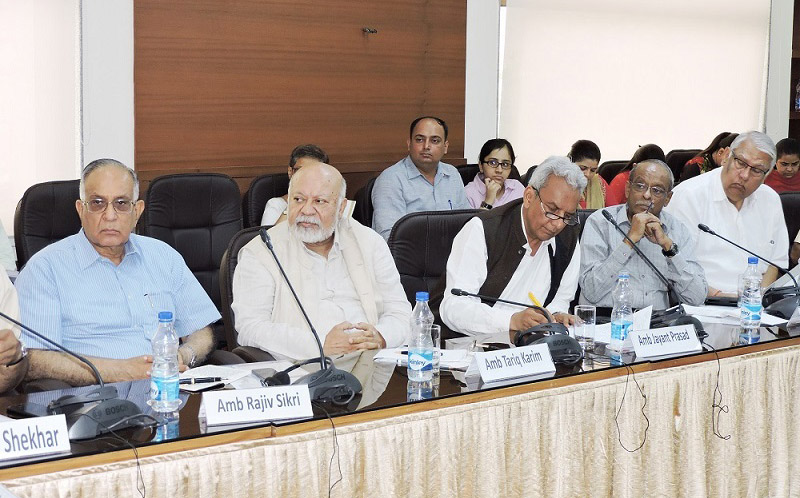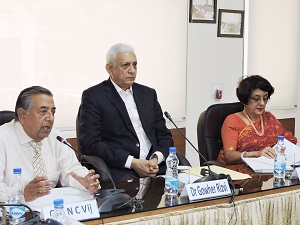Following up on Bangladesh Prime Minister Sheikh Hasina’s highly successful and ‘historic’ visit to India undertaken in the month of April, the Vivekananda International Foundation (VIF) organised a Round Table Discussion (RTD) on 06 Jun 2017 with Dr. Gowher Rizvi, Advisor to the Prime Minister of Bangladesh on international relation. The RTD was aimed at taking stock of the entire gamut of bilateral relations between India and Bangladesh in a post-visit scenario, and secondly, at giving fresh impetus to some of the stalled joint projects, especially those linked to infrastructure development. The event, held amid a high degree of mutual understanding, underscored the progress made by the two countries in their bilateral ties, especially during Prime Minister Sheikh Hasina’s four-day state visit to India. Incidentally, by the end of Prime Minister Sheikh Hasina’s visit, as many as 34 agreements and Memorandum of Understanding (MoUs) across various fields, including defence cooperation and investments in infrastructure building were concluded between the two countries.

In his opening remarks, General NC Vij, Director VIF opined that the range and number of agreements and MoUs signed between the two countries during Hon’ble Sheikh Hasina’s visit reflects the degree of intensity of our relations. The Director further hoped India-Bangladesh ties will continue to spiral in a positive trajectory even as he wished Prime Minister Sheikh Hasina a next term in office. Dr. Gowher Rizvi started off by dwelling on the complimentary nature of India-Bangladesh relations – contagious geography, shared history and a joint vision for the future. He stressed improving ties with India has remained on top of Prime Minister Sheik Hasina’s agenda right from the beginning of her taking over as a Prime Minister. Amid growing cooperation between India and Bangladesh across a number of areas – settling of the land and maritime disputes, trade facilitation, anti-terrorism cooperation, among others - Dr. Rizvi laid stress on making positive bilateral trends irreversible. Significantly, Dr. Rizvi also pointed out that Bangladesh has moved away from its erstwhile transactional approach in relation to India and is looking at the mutuality’s from a closer sub-regional perspective. Taking a broad view of the progress made across the bilateral spectrum - water, energy, connectivity, trade and investments, and security - Dr. Rizvi stated that the achievements have been spectacular and in some cases even mind-boggling.

He however stressed that impending elections in Bangladesh mandates both countries to bring their focus on speeding up projects that long have remained delayed due to various reasons. Bangladesh, being largely an agrarian country and highly dependent on waters flowing from India, much of Dr. Rizvi’s talk was focused on water-related issues, especially the Farakka Barrage, river-basins and water transport. Subsequently, Mr. Sekhar Sinha, former Secretary Water Resource, Government of India, provided an Indian perspective on some of the technical issues involved in these projects. The interactive session underlined the internal political dynamics in India as well as in Bangladesh, and their spill-over effects on the bilateral relationship. Bilateral cooperation in a sub-regional framework, Bangladesh-China relations, and madrasa reforms in Bangladesh were a few amongst other issues that came up for examination during the interactive session. Amb Tariq Karim, former Bangladesh Ambassador to India and Amb Rajiv Sikri, former Secretary, Ministry of External Affairs, were prominent among those who shared their perspectives on India-Bangladesh relations. Amb Veena Sikri, a former Indian Ambassador to Bangladesh and one India’s foremost voices on Bangladesh, made the concluding remarks.



